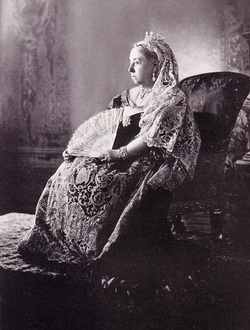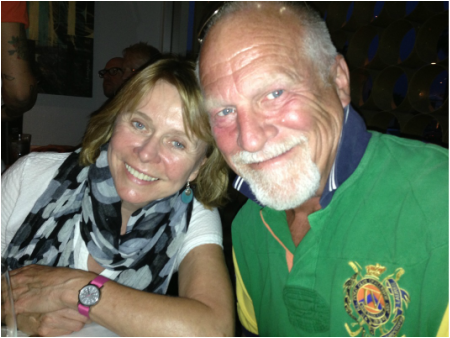 Queen Victoria--one of her official portraits
Queen Victoria--one of her official portraits On one of the nights that Mark was very restless, I slept on our sofa sleeper. The next day, with impressions of its support bars imprinted on my back, I was determined to find a better alternative for our guest space. One of Mark’s and my last excursions was a visit to a furniture store to buy a replacement.
Mark was very weak but enthusiastic about the shopping trip. We walked slowly, stopping often, and he sat down as soon as we entered the store. Although we were only looking for a sofa, Mark fell in love with a very spiffy rolling office chair and insisted that we buy it for me. I’d been using a dining room chair in our office, but no, Mark was adamant, we had to buy this chair. He couldn’t wait for it to arrive because it was going to be so comfortable—I was going to love it, he said.
Well, the chair arrived today.
This widowhood business is tricky. The first week was ghastly. My son Chris and I were both exhausted and in shock. I suspect I have some version of PTSD, because the images of those last hours, as Mark’s unconscious labored breaths came further and further apart as I held his hand, are seared into my brain. The images surface night and day, over and over again.
But the second week was almost worse, in a different way. I’d be folding laundry, or driving to the grocery store, and I’d forget for the moment that Mark is gone. And then I’d remember, and the pain would resurface anew, like a fresh cut. Chris told me that he was having similar experiences.
Widowhood. Certainly not a unique state of being. According to the US Census Bureau, “Nearly 700,000 women lose their husbands each year and will be widows for an average of 14 years.” The United Nations reports that at least 245 million women around the world have been widowed. The condition may be common, but it is devastating: On the Holmes and Rahe stress scale, death of a spouse is ranked as the number one stressor.
Unless we’ve had the terrible misfortune to be widowed more than once, I don’t think most of us have any handy template for this life change. I don’t have any model to follow for becoming a “successful widow.” In fact, when I think “widow,” I think of Queen Victoria, the consummate drama queen widow who, after losing her beloved husband Prince Albert, lived in deep mourning, avoiding public appearances and wearing only black, for the following 40 years until her death. As terribly sad as I feel now, that just doesn’t sound like me.
Short-term, there’s plenty to do to occupy my time. A staggering list of administrative tasks awaits, involving estates, death certificates, bank accounts, credit cards, titles and the organization of the medical bills which are still arriving. Some tasks I can’t manage yet: A large bowl of unopened condolence cards sits on the dining room table. Although I so appreciate the love and support represented by that pile of cards, I can’t face them quite yet.
I spent some time with my dear friend who is an estate planning lawyer. I asked her what I should watch out for, as I start my travel through this new land. Without hesitation, she responded, “Predatory men.”
Yikes! That’s the last thing I was worried about (and just about the last thing I’ve been thinking about). Predatory men? It brings to mind a cartoon villain with a foxy face and a handlebar mustache, hunched over in a bad black suit, conspiring to rob me of the deed to the family farm. I’ll think I’ll put that particular worry aside for now.
Now I’m more focused on making it through each day. Sorrow is my constant travel companion, but it ebbs and flows. Earlier this week I hiked in the Cascades with a group of friends. The weather was glorious and the scenery spectacular. I felt drawn back into the world, and that was a good thing. But there are times when the crush of grief is overwhelming.
Each night before I go to sleep I try to focus on at least one positive thing in my life, and really, there are so many. My son is here and is a great help. I’m in my own home and unlike many other widows, I don’t have to worry about losing it. I have wonderful friends who have stepped up to help me, walking with me, meeting me for meals—even writing Mark’s obituary for me, because I just couldn’t do it. I have much to be grateful for.
Which brings me back to that office chair. My husband who loved me bought me that chair. Right now, sitting in the new chair has unleashed the grief again, but the tears will pass. It is a truly wonderful chair.

 RSS Feed
RSS Feed
